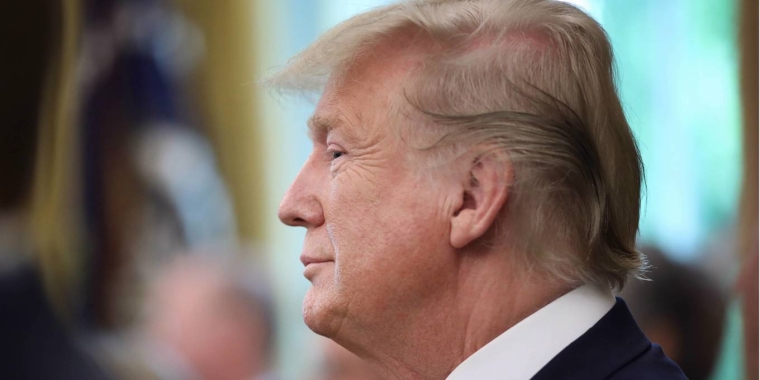
Blinded by a surging stock market and a 50-year low in the unemployment rate, few dare to challenge the wisdom of US economic policy. Instant gratification has compromised the rigor of objective and disciplined analysis. Big mistake. The toxic combination of ill-timed fiscal stimulus, aggressive imposition of tariffs, and unprecedented attacks on the Federal Reserve demands a far more critical assessment of Trumponomics.
Politicians and pundits can always be counted on to spin the policy debate. For US President Donald Trump and his supporters, the art of the spin has been taken to a new level. Apparently, it doesn’t matter that federal deficits have been enlarged by an estimated $1.5 trillion over the next decade, or that government debt will reach a post-World War II record of 92% of GDP by 2029. The tax cuts driving these worrying trends are rationalized as what it takes to “Make America Great Again.”
Nor are tariffs viewed as taxes on consumers or impediments to global supply-chain efficiencies; instead, they are portrayed as “weaponised” negotiating levers to force trading partners to change their treatment of the United States. And attacks on the Fed’s independence are seen not as threats to the central bank’s dual mandate to maximize employment and ensure price stability, but rather as the president’s exercise of his prerogative to use the bully pulpit as he – and he alone – sees fit.
There are three basic flaws with Trump’s approach to economic policy. First, there is the disconnect between intent and impact. The political spin maintains that large corporate tax cuts boost US competitiveness. But that doesn't mean deficits and debt don’t matter. Notwithstanding the hollow promises of supply-side economics, revenue-neutral fiscal initiatives that shifted the tax burden from one segment of the economy to another would have come much closer to real reform than the reduction of the overall revenue trajectory has. Moreover, the enactment of fiscal stimulus in late 2017, when the unemployment rate was then at a cyclical low of 4.1% (headed toward the current 3.6%), added froth to markets and the economy when it was least needed and foreclosed the option of additional stimulus should growth falter.
Similarly, Trump’s tariffs fly in the face of one of the twentieth century’s greatest policy blunders – the Smoot-Hawley Tariff of 1930, which sparked a 60% plunge in global trade by 1932. With foreign trade currently accounting for 28% of GDP, versus 11% in 1929, the US, as a debtor country today, is far more vulnerable to trade-related disruptions than it was as a net creditor back then.
Ignoring the cascading stream of direct and retaliatory taxes on consumers and businesses that stem from a tariff war, Trump extols the virtues of tariffs as “a beautiful thing.” That is painfully reminiscent of the 1928 Republican Party platform, which couched tariffs as “a fundamental and essential principle of the economic life of this nation … and essential for the continued prosperity of the country.” Trump ignores the lessons of the 1930s at great peril.
The same can be said of Trump’s recent Fed bashing. The political independence of central banking is widely regarded as the singular breakthrough needed to achieve price stability following the Great Inflation of the 1970s. In the US, passage of the so-called Humphrey-Hawkins Act of 1978 gave then-Fed Chairman Paul Volcker the political cover to squeeze double-digit inflation out of the system through a wrenching monetary tightening. Had Volcker lacked the freedom to act, he would have been constrained by elected leaders’ political calculus – precisely what Trump is doing in trying to dictate policy to current Fed Chair Jerome Powell.
The second critical flaw in Trump’s economic-policy package is its failure to appreciate the links between budget deficits, tariffs, and monetary policy. As the late Martin Feldstein long stressed, to the extent that budget deficits put downward pressure on already depressed domestic saving, larger trade deficits become the means to fill the void with surplus foreign saving. Denial of these linkages conveniently allows the US to blame China for self-inflicted trade deficits.
But with tariffs likely to divert trade and supply chains from low-cost Chinese producers to higher-cost alternatives, US consumers will be hit with the functional equivalent of tax hikes, raising the risk of higher inflation. The latter possibility, though seemingly remote today, could have important consequences for US monetary policy – provided, of course, the Fed has the political independence to act.
Finally, there are always the lags to keep in mind in assessing the impact of policy. While low interest rates temper short-term pressures on debt-service costs as budget deficits rise, there is no guarantee that such a trend will persist over the longer term, especially with the already-elevated federal debt overhang projected to increase by about 14 percentage points of GDP over the next ten years. Similarly, the disruptive effects of tariffs and shifts in monetary policy take about 12-18 months to be fully evident. So, rather than bask in today’s financial-market euphoria, politicians and investors should be thinking more about the state of the economy in late 2020 – a timeframe that happens to coincide with the upcoming presidential election cycle – in assessing how current policies are likely to play out.
There is nothing remarkable about a US president’s penchant for political spin. What is glaringly different this time is the lack of any pushback from those who know better. The National Economic Council, established in the early 1990s as an “honest broker” in the executive branch to convene and coordinate debate on key policy issues, is now basically dysfunctional. The NEC’s current head, Larry Kudlow, a long-standing advocate of free trade, is squirming to defend Trump’s tariffs and Fed bashing. The Republican Party, long a champion of trade liberalisation, is equally complicit.
Trump’s vindictive bluster has steamrolled economic-policy deliberations – ignoring the lessons of history, rejecting the analytics of modern economics, and undermining the institutional integrity of the policymaking process. Policy blunders of epic proportion have become the rule, not the exception. It won’t be nearly as easy to spin the looming consequences.
Stephen S. Roach, a faculty member at Yale University and former Chairman of Morgan Stanley Asia, is the author of Unbalanced: The Codependency of America and China. Copyright: Project Syndicate, 2019, published here with permission.
6 Comments
It has more or less been proven that it doesn’t really matter what Trump says anymore than what anyone says about Trump. He is POTUS and likely to be so for another 5 years or so. Unlikely as it seems, he is apparently scandal proof. He is not that young. The impact of his actions, positive or negative, will not much surface until after he has passed on. Something like Reagan. Unfortunately though , the real danger is that he has the potential to miscalculate and catalyse a major war, more so than any other international leader since Hitler.
"Blinded by a surging stock market and a 50-year low in the unemployment rate, few dare to challenge the wisdom of US economic policy"
Plenty are but msm prefers to not give them much voice. A bit like the NZ msm and housing spin.
Yes, I'm sure there are many historical lessons for us all to learn from, but sadly, we seem to ignore them quite frequently. Whether the Trumpet has miscalculated only time will tell, in fact from my position, he looks to be heading for conflict, & there are no shortage of potential suspects here. It almost seems to be part of his game plan that he will blow someone off the map as a threat to the rest of the planet, just to keep the USA Great. Working this out is not rocket science. My concern is where exactly? I would prefer it not to be the South China Sea.
I think debt is an issue but record high stock market, record low unemployment (more job openings than people unemployed), and good growth are good things. So if you are blaming Trump for the debt then he gets the credit for the other three. Let us also remember that the alternatives want to increase spending - Bernie's "medicare for all" would add more than 3 trillion to the federal budget. Also MMT is starting to become vogue in the Democratic Party circles so voting Trump out won't herald in a fiscal moderate let alone a fiscal conservative. The real issue for the Federal debt though is spending on social security and other entitlements - until the Dems and Republicans get serious about that the rest is mere talk.
Also the tariffs are weapons - that's right - not economic policies. Trump has said over and over again that he wants free trade but when the Chinese cheat then what is the US or any other country to do? The WTO? Magic words won't change Chinese mis-behaviour but these tariffs might.
Trump has already proven himself to be corrupt, dangerous and a wannabe dictator. I hope everyone realizes just how much he's gummed up and destabilized the global economy with his narrow mind protectionism. Pushing tariffs everywhere which hurts even their own economy, causing a chain reaction particularly on China which of course impacts us further down the track.
The good news is that he's likely to be voted out come next election, if he's not impeached first.
Some one had to do something about China. There was never going to be a good time, and there's no perfect way to deal with it, but the world sat by and watched China steal jobs and intellectual property for the past 30 years. They've made themselves rich at the expense of the west. Sure, we can now all buy $40 power drills, and cheap laptops, but at what cost? Trumps the only one to realize this can't continue. Tariffs aren't great, but it's the most effective tool he has. Sure there are downsides to these policies, but if we let China get any more powerful / rich, I don't think it will end well for the rest of us.

We welcome your comments below. If you are not already registered, please register to comment
Remember we welcome robust, respectful and insightful debate. We don't welcome abusive or defamatory comments and will de-register those repeatedly making such comments. Our current comment policy is here.